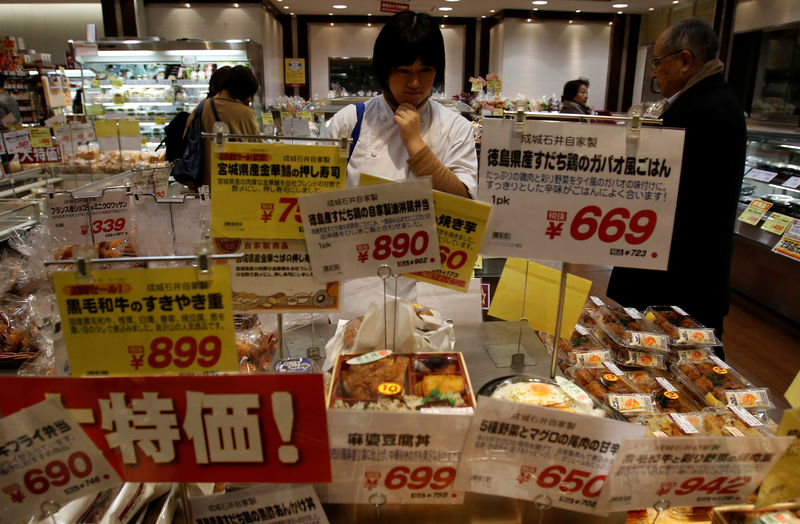By Stanley White
TOKYO (Reuters) - Japan's household spending rose less than expected in February and real wages tumbled at the fastest pace in more than three years, raising concerns about the hit to the consumer sector from heightening global uncertainties.
The data is likely to be discussed by policymakers worried that risks to the export sector from ongoing trade disputes may discourage firms from raising wages, which in turn would hurt consumption.
The 1.7 percent year-on-year increase in household spending was less than the median estimate for a 2.1 percent increase and followed a 2.0 percent increase in January.
Taken with separate wages data, also released on Friday, the numbers suggested household income may not be strong enough to underpin consumption at a time when exports and output are weakening due to the U.S.-Sino trade war.
The data also suggest the government could come under pressure to delay a planned sales tax hike and turn to the Bank of Japan (BOJ) for help in supporting the economy.
"Labour shortages are not pushing up wages, and you need wages to rise for inflation expectations to rise," said Norio Miyagawa, senior economist at Mizuho Securities.
"The BOJ is on hold for now, but it may have to come up with something if there is another downside shock to the economy."
The growth in household consumption in February was driven by spending on autos and mobile phone charges.
Inflation-adjusted real wages in Japan fell 1.1 percent in February from a year ago, the fastest decline since June 2015.
The soft household sector indicators follow signs of similar weakness in the corporate sector.
Japan's business mood slumped to a two-year low in the March quarter, a central bank survey showed on April 1, highlighting the impact the Sino-U.S. trade war was having on sentiment and economic activity.
Factories across Japan depend heavily on selling electronic parts and heavy equipment to manufacturers in China, which leaved Japan exposed to tit-for-tat tariffs between Washington and Beijing.
The data on consumer spending and wages is likely to raise concerns about the economy. There are still risks to domestic demand, and expectations may heighten for the BOJ to ease monetary policy further.
The government plans to raise the nationwide sales tax to 10 percent from 8 percent in October to generate extra revenue for rising welfare costs.
Some economists and politicians worry that if this plan is not delayed then consumer spending will weaken after the tax hike.
The BOJ is in a bind over how to manage the economy. Years of heavy money printing and prolonged ultra-low rates have dried up the bond market and squeezed profits at banks, prompting Japan's banking lobby to urge the BOJ to rethink its monetary stimulus.
However, Japan's economic outlook this year is weaker than last year's, which supports the argument that the BOJ will eventually need to come up with some measures to keep already low inflation from slowing.
